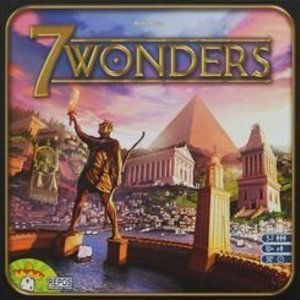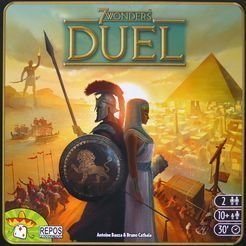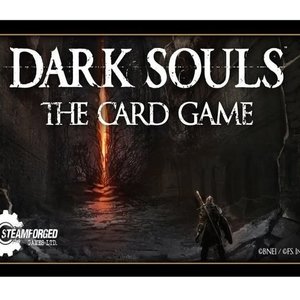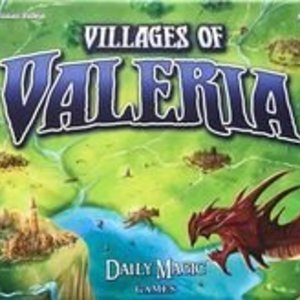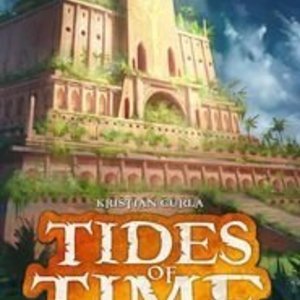Search
Search results
The Marinated Meeple (1853 KP) rated 7 Wonders in Tabletop Games
Mar 7, 2018
High Player Count (3 more)
Card Drafting Stratagy
Building your engine
Artwork
Card Drafting and Civilization building at it's finest, with a large player count which is so hard to find.
love this game, plus it's 2 player version 7 Wonders Duel. it's a really great light to medium weight game about how you choose to build your civilization. You start with a wonder, which gives you a starting power/resource, then you build from there by adding card to your tableau which in turn gives you the ability to buy more things. you can build your military and bully your neighbors, or focus on knowledge, or make sure your civilization is rich with resources and money, and trade with your neighbors... Each thing you do builds up to doing more. Great Game especially showcases what modern games can do and still good for relative beginners to the Board game world.
Red Otter (340 KP) rated 7 Wonders Duel in Tabletop Games
May 29, 2019
Strategic drafting (2 more)
Multiple Strategies
Variability
A re-imagining of the themes of 7 Wonders aka drafting and civilization building for a 2 player scenario. I love this game as it utilizes some public and hidden information to make every decision count. The draft setups allow for planning and many different strategies exist. It's a wonderful take on the core themes of the original game and makes it even better! The card quality isn't the best so it's best to get some sleeves for them.
Chelsey Young (29 KP) rated Unstable Unicorns in Tabletop Games
Mar 13, 2018
Jason James (3 KP) rated Founders of Gloomhaven in Tabletop Games
Apr 4, 2019
Founders of Gloomhaven is a 1 to 4 player cooperative/competitive game. In short, players must work to build the city of Gloomhaven. The game provides a two-sided board and depending on which side you choose it slightly changes how the game is played. All players choose a character race and any additional resource cards. This determines which resources the players will automatically own during the game. However, other players will have the opportunity to buy access to resources they do not own. This is vital when building "upgraded" buildings. Each player starts with the same five cards (six cards in a two-player game). Players will have a chance to acquire new card by recruiting advisers, which are upgraded versions of the base cards. Play begins with a player laying down a card they wish to play. They follow the instructions on the top of the card, and then each other player will have a chance to follow the instructions laid out on the bottom of the card. Card actions can always be switched out with a set of basic actions (collect one gold or influence, build a road, or place a worker). If a player chooses (or is forced) to play a "Call to Vote" card, they collect one gold or influence, or build one road for each of the remaining cards in their hand. They reset all of their workers and collect their discard pile. All other players have a chance to collect gold based on the number of resources they own. Then all players vote for which prestige building they want to be built. All players reveal their choice token along with any influence they wish to spend. The player with the most votes gets to place the building anywhere on the map. Points are scored by connecting upgraded buildings to resources you own but is slightly more difficult with the games unique "trickle down" scoring system. This means that some points may have to be shared with players who own base the resources or other upgraded building needed to build the building that was just placed.
Overall this game is for people who enjoy other similar games like Catan or Ticket to Ride. Players must adjust to the fact that roads are public tiles that can connect any players resources to buildings. The game is high statistical and players must be able to make decisions that may result in other players gaining points. I would give the game an 8/10 as it brings a fresh feel to city-building board games! If you have any questions or have any comments on my review please feel free to message me.
Thanks!
Overall this game is for people who enjoy other similar games like Catan or Ticket to Ride. Players must adjust to the fact that roads are public tiles that can connect any players resources to buildings. The game is high statistical and players must be able to make decisions that may result in other players gaining points. I would give the game an 8/10 as it brings a fresh feel to city-building board games! If you have any questions or have any comments on my review please feel free to message me.
Thanks!
Bostonian916 (449 KP) rated Star Wars: Episode VIII - The Last Jedi (2017) in Movies
Aug 18, 2020
The story building in this franchise is probably going to be remembered as one of the best in cinematic history. Universe after literal universe is built upon in usually glorious and beautiful ways.
The thought that all of this stemmed from one mans mere imagination is bewildering to me.
Unearthing answers to stories of yesteryear (as well as more recent installments) we are somehow still left with a slew of questions that beg to be responded to. That, my friends, is actually the calling card of great world building. Feed you your dessert, and then make you realize that was literally just the appetizer.
The thought that all of this stemmed from one mans mere imagination is bewildering to me.
Unearthing answers to stories of yesteryear (as well as more recent installments) we are somehow still left with a slew of questions that beg to be responded to. That, my friends, is actually the calling card of great world building. Feed you your dessert, and then make you realize that was literally just the appetizer.
Lumos (380 KP) rated Mystic Vale in Tabletop Games
Mar 18, 2018
I think this card-building game is really well done. I like the ability to add modifiers to your cards to change how your deck plays. The element of luck just adds more depth to the game. My one criticism is that it is easy to tell which cards are modified (because they are thicker), so if you are paying attention to what you have in your deck, you know if it is safe to push your luck before you bust.
Mickeydubz (4 KP) rated Dark Souls: The card game in Tabletop Games
Apr 29, 2019
Really captures the atmosphere of Dark Souls (3 more)
Forces players to work together if they want to survive
The deck building allows you to customise your play style
A fun and replayable solo mode
The rulebook is confusing to say the least (3 more)
The setup and take down of the game is time consuming
This is not a game for those with short attention spans
Boss fights feel anticlimactic
Great idea, bad execution
The Dark Souls card game is a deep card game that has good replay value and a customisable deck building system that really feels like it exists in the Souls universe. If you enjoy the video game series and deck building games, then you're going to love the Dark Souls board game.
If you are planning on playing it though, you're going to need a few hours free to clear a full game. Most of the games I've played have been 3 hours from setup to takedown, though I have had games as short as 2 hours and as long as 4, it really depends on the skill and experience of your play group. Fortunately, DS is a mostly skill based game with elements of luck that you'd expect from any card game. Build your deck right and play as a team and you shouldn't have too many problems though.
In short, this is a great way to spend an evening, but it's definitely not a game you'll want to play every week. Pick it up and bring it out when you fancy a challenge, you won't regret having it in your collection.
If you are planning on playing it though, you're going to need a few hours free to clear a full game. Most of the games I've played have been 3 hours from setup to takedown, though I have had games as short as 2 hours and as long as 4, it really depends on the skill and experience of your play group. Fortunately, DS is a mostly skill based game with elements of luck that you'd expect from any card game. Build your deck right and play as a team and you shouldn't have too many problems though.
In short, this is a great way to spend an evening, but it's definitely not a game you'll want to play every week. Pick it up and bring it out when you fancy a challenge, you won't regret having it in your collection.
Purple Phoenix Games (2266 KP) rated Tiny Epic Western in Tabletop Games
Dec 30, 2021
It’s no secret that we at Purple Phoenix Games are fans of the Tiny Epic series. But one that had evaded our reviews until this point was Tiny Epic Western. Admittedly, this one has been sitting on my shelf of shame for quite some time, so I finally decided it was time to take it off the shelf and bring it to the table! After squaring up with TEW, how does it compare to the rest in the series? Is this the rootinest tootinest of the bunch, or should it be bucked off my shelf?
Disclaimer: I do not intend to rehash the entire rulebook in this review, as there are just too many details, but will instead provide a more general overview of the rules and gameplay. -L
Tiny Epic Western is a game of worker placement and set collection in which players are trying to amass the most end-game victory points. Played over a series of rounds, players will be placing their Posse (Meeples), collecting Influence and taking actions, dueling opponents (if necessary), playing a bit of poker, and buying buildings in an effort to become the most powerful boss in this wild west town. To setup for a game, place the Location Mats as described in the rules, dealing a Building Card where appropriate. Each player receives a Boss card, 3 Posse tokens (Meeples), and one of each of the Influence trackers (Money, Law, and Force), placed on the 1 space of their card. Shuffle the decks of Building Cards and Poker Cards separately, choose a starting player (who receives the Dealer token), place the Wanted card/Gunslinger dice in the center of the play area, and the game is ready to begin! Pictured below is the starting setup for a 3-player game.
The game is played over 6 total rounds, each of which is broken into 4 phases: Shuffle and Deal, Posse Placement, Resolution, and Buy. To start a round, the Dealer shuffles the deck of Poker cards, and then deals 1 card face-up to the 6 empty spaces between the Location Mats. One Poker card is dealt face-down to the Rival Space (under the Town Hall Location Mat), and 2 Poker cards are dealt face-down to each player. Players look at both of their cards and pick 1 to keep, discarding the other. The round then moves to phase 2: Posse Placement. Starting with the Dealer, players will take turns placing Posse tokens onto the placement spots on any of the Location mats. All placement spots grant unique benefits (collecting different Influence or performing Building card actions) that are performed either immediately or during later phases of the round. What happens if an opponent took a placement spot that you wanted? Then it’s time for an old-fashioned duel! The dueling players each roll a Gunslinger die, modify it if they so choose, and determine a winner. Players continue taking turns placing Posse tokens until all available Posse tokens have been placed.
When all Posse tokens have been placed, the round moves to phase 3: Resolution. The first step of this phase is to reveal Poker cards – all players reveal their cards, and the card in the Rival Space is also revealed. Moving clockwise from the Town Hall, each Location will be resolved by ‘playing’ three-card poker. Each Location has 2 Poker cards directly adjacent to it (placed between the Locations in phase 1), and those 2 cards plus the one in your hand will form your Poker hand. Any players with Posse tokens on the Location will compare their Poker hands to determine a winner. If you win the hand, you collect the Winner’s Pot (extra benefits) and are able to collect any delayed benefits from placement spots in the Posse Placement phase. Losing the hand earns you nothing *womp womp*. If you are the only Posse on a Location (with no opponents) you will compare your hand to that of the Rival. The Rival’s hand uses the cards adjacent to the Town Hall, plus the revealed card in the Rival Space. If you have a better hand, you win the benefits on your Location. If the Rival wins, though, you do not collect these benefits. All Locations are resolved in this fashion before the last phase of the round, Buy, begins.
To start this phase, all players will compare their three-card Poker hands using the 2 Poker cards adjacent to the Town Hall. The player with the best hand will act first in this phase, followed by the next best hand, and so on. The first player may now choose to buy a Building card from any Location on which they have a Posse token. Pay the requisite amount of Influence to purchase a Building, and add it to the Porch Slot on your color-corresponding Location Mat. The power granted by this Building card is now available for use in future rounds. Once all players have had the option to purchase a Building, the player with the best hand will advance one of the Industry Tokens at Town Hall. The placements of Industry Tokens will affect end-game scoring, so keep that in mind as the game progresses. When all steps of the Buy phase are performed, the round now ends. Players collect all their Posse tokens back to their boss cards, all Poker cards are collected and re-shuffled, new Building cards are dealt to Locations from which they were purchased this round, and the Dealer token is passed to the next clockwise player. If a player did not buy a Building at all during the round, they have gained the Third Posse Benefit for the coming round – granting them an additional Posse token to place during phase 2. Otherwise, all players will only ever have 2 Posse tokens to place.
After a total of 6 complete rounds, the game ends and points are tallied. Victory Points are earned from Building cards bought throughout the game. Building cards have a specified VP amount, and also have a collection of Industry Icons on them. Using the final placement of the Industry Tokens on the board, players will earn points for Industry Icon sets they have collected. And finally, whomever holds the Wanted card (won the last duel) gains an additional 2 VP. Points are all counted, and the player with the highest score is the winner.
That all probably sounds pretty complicated. But I do have to say that verbally explaining/teaching the game (and being able to use components for examples) is waaaaay easier than doing so through a text review. So please do not let the seemingly complex gameplay turn you off from this game. Once you get a basic understanding of the phases of each round, the game moves along pretty seamlessly. Honestly, the biggest learning curve for me to conquer was playing three-card poker. As someone who has never played any form of poker before, this was probably what had me most hesitant about learning TEW. After having played it now, three-card poker really isn’t too complicated, and there are some nice player reference cards to help you figure it out.
Aside from the poker element, this game really comes down to worker placement and strategy. Each Location card only has a finite number of placement spots, and the resources required to buy Buildings are not exactly in abundance. This affects your strategy, as you must decide which resources to collect at what times, as well as deciding whether you need to duel someone for a coveted resource. Another element to your strategy? You may only buy Building cards from Locations on which you have a Posse token. Maybe none of those placement spots really appeal to you this round, but you reaaaaally want that specific Building card. Are you willing to ‘burn’ a Posse token for the chance to buy it? Or is there a different Location that offers a useful resources and a desirable Building card? Also, keep in mind how your poker hand will come into play. Since poker cards are dealt to each Location at the start of a round, you are able to see what your hand will be for each Location. Maybe you have a pretty strong hand at the Bank Location, but at the Courthouse the cards end up being a bust. Are you willing to risk a placement in hopes that you have the best hand of the bunch? Because remember – if you don’t have the best hand at a Location, you get no resources/rewards! There are so many elements to a successful strategy with this game, and it really keeps all players engaged at all times. Be warned though – the variety of strategic options could be difficult for some AP-prone players.
Let me touch on components for a minute. As with all Tiny Epic games, the production quality of TEW is pretty stellar. The cards are nice and sturdy, and the iconography is clear. The Posse tokens are cute Meeples with cowboy hats, and they are nice and chunky. The only thing I don’t really like about this game are the Gunslinger dice. In theory, they are super cool, but in actual execution, they leave much to be desired. The numbers aren’t really clearly define, so they’re a bit tricky to read. Aside from that, a pretty high quality game here.
So all in all, how does Tiny Epic Western stand up in the series? It is definitely one of the heavier games of the bunch, and there is so much more going on than initially meets the eye. It feels daunting for the first few plays, but once you get the phases under your belt, it really flows pretty well. I can’t say that it is my favorite Tiny Epic game, as I just personally feel like there are too many elements going on at the same time. You’re strategizing your worker placement, but also need to consider buying Buildings for VP and to collect sets of Industry Icons and for their specific abilities, as well as figuring out your poker hand for 5 different Locations, and dealing with duels. Some people might really be into that amount of strategic forethought, but it feels a bit cumbersome to me. That being said, Purple Phoenix Games gives this three-card poker game a 3/6. The gameplay is decent, just not really my kind of game.
Disclaimer: I do not intend to rehash the entire rulebook in this review, as there are just too many details, but will instead provide a more general overview of the rules and gameplay. -L
Tiny Epic Western is a game of worker placement and set collection in which players are trying to amass the most end-game victory points. Played over a series of rounds, players will be placing their Posse (Meeples), collecting Influence and taking actions, dueling opponents (if necessary), playing a bit of poker, and buying buildings in an effort to become the most powerful boss in this wild west town. To setup for a game, place the Location Mats as described in the rules, dealing a Building Card where appropriate. Each player receives a Boss card, 3 Posse tokens (Meeples), and one of each of the Influence trackers (Money, Law, and Force), placed on the 1 space of their card. Shuffle the decks of Building Cards and Poker Cards separately, choose a starting player (who receives the Dealer token), place the Wanted card/Gunslinger dice in the center of the play area, and the game is ready to begin! Pictured below is the starting setup for a 3-player game.
The game is played over 6 total rounds, each of which is broken into 4 phases: Shuffle and Deal, Posse Placement, Resolution, and Buy. To start a round, the Dealer shuffles the deck of Poker cards, and then deals 1 card face-up to the 6 empty spaces between the Location Mats. One Poker card is dealt face-down to the Rival Space (under the Town Hall Location Mat), and 2 Poker cards are dealt face-down to each player. Players look at both of their cards and pick 1 to keep, discarding the other. The round then moves to phase 2: Posse Placement. Starting with the Dealer, players will take turns placing Posse tokens onto the placement spots on any of the Location mats. All placement spots grant unique benefits (collecting different Influence or performing Building card actions) that are performed either immediately or during later phases of the round. What happens if an opponent took a placement spot that you wanted? Then it’s time for an old-fashioned duel! The dueling players each roll a Gunslinger die, modify it if they so choose, and determine a winner. Players continue taking turns placing Posse tokens until all available Posse tokens have been placed.
When all Posse tokens have been placed, the round moves to phase 3: Resolution. The first step of this phase is to reveal Poker cards – all players reveal their cards, and the card in the Rival Space is also revealed. Moving clockwise from the Town Hall, each Location will be resolved by ‘playing’ three-card poker. Each Location has 2 Poker cards directly adjacent to it (placed between the Locations in phase 1), and those 2 cards plus the one in your hand will form your Poker hand. Any players with Posse tokens on the Location will compare their Poker hands to determine a winner. If you win the hand, you collect the Winner’s Pot (extra benefits) and are able to collect any delayed benefits from placement spots in the Posse Placement phase. Losing the hand earns you nothing *womp womp*. If you are the only Posse on a Location (with no opponents) you will compare your hand to that of the Rival. The Rival’s hand uses the cards adjacent to the Town Hall, plus the revealed card in the Rival Space. If you have a better hand, you win the benefits on your Location. If the Rival wins, though, you do not collect these benefits. All Locations are resolved in this fashion before the last phase of the round, Buy, begins.
To start this phase, all players will compare their three-card Poker hands using the 2 Poker cards adjacent to the Town Hall. The player with the best hand will act first in this phase, followed by the next best hand, and so on. The first player may now choose to buy a Building card from any Location on which they have a Posse token. Pay the requisite amount of Influence to purchase a Building, and add it to the Porch Slot on your color-corresponding Location Mat. The power granted by this Building card is now available for use in future rounds. Once all players have had the option to purchase a Building, the player with the best hand will advance one of the Industry Tokens at Town Hall. The placements of Industry Tokens will affect end-game scoring, so keep that in mind as the game progresses. When all steps of the Buy phase are performed, the round now ends. Players collect all their Posse tokens back to their boss cards, all Poker cards are collected and re-shuffled, new Building cards are dealt to Locations from which they were purchased this round, and the Dealer token is passed to the next clockwise player. If a player did not buy a Building at all during the round, they have gained the Third Posse Benefit for the coming round – granting them an additional Posse token to place during phase 2. Otherwise, all players will only ever have 2 Posse tokens to place.
After a total of 6 complete rounds, the game ends and points are tallied. Victory Points are earned from Building cards bought throughout the game. Building cards have a specified VP amount, and also have a collection of Industry Icons on them. Using the final placement of the Industry Tokens on the board, players will earn points for Industry Icon sets they have collected. And finally, whomever holds the Wanted card (won the last duel) gains an additional 2 VP. Points are all counted, and the player with the highest score is the winner.
That all probably sounds pretty complicated. But I do have to say that verbally explaining/teaching the game (and being able to use components for examples) is waaaaay easier than doing so through a text review. So please do not let the seemingly complex gameplay turn you off from this game. Once you get a basic understanding of the phases of each round, the game moves along pretty seamlessly. Honestly, the biggest learning curve for me to conquer was playing three-card poker. As someone who has never played any form of poker before, this was probably what had me most hesitant about learning TEW. After having played it now, three-card poker really isn’t too complicated, and there are some nice player reference cards to help you figure it out.
Aside from the poker element, this game really comes down to worker placement and strategy. Each Location card only has a finite number of placement spots, and the resources required to buy Buildings are not exactly in abundance. This affects your strategy, as you must decide which resources to collect at what times, as well as deciding whether you need to duel someone for a coveted resource. Another element to your strategy? You may only buy Building cards from Locations on which you have a Posse token. Maybe none of those placement spots really appeal to you this round, but you reaaaaally want that specific Building card. Are you willing to ‘burn’ a Posse token for the chance to buy it? Or is there a different Location that offers a useful resources and a desirable Building card? Also, keep in mind how your poker hand will come into play. Since poker cards are dealt to each Location at the start of a round, you are able to see what your hand will be for each Location. Maybe you have a pretty strong hand at the Bank Location, but at the Courthouse the cards end up being a bust. Are you willing to risk a placement in hopes that you have the best hand of the bunch? Because remember – if you don’t have the best hand at a Location, you get no resources/rewards! There are so many elements to a successful strategy with this game, and it really keeps all players engaged at all times. Be warned though – the variety of strategic options could be difficult for some AP-prone players.
Let me touch on components for a minute. As with all Tiny Epic games, the production quality of TEW is pretty stellar. The cards are nice and sturdy, and the iconography is clear. The Posse tokens are cute Meeples with cowboy hats, and they are nice and chunky. The only thing I don’t really like about this game are the Gunslinger dice. In theory, they are super cool, but in actual execution, they leave much to be desired. The numbers aren’t really clearly define, so they’re a bit tricky to read. Aside from that, a pretty high quality game here.
So all in all, how does Tiny Epic Western stand up in the series? It is definitely one of the heavier games of the bunch, and there is so much more going on than initially meets the eye. It feels daunting for the first few plays, but once you get the phases under your belt, it really flows pretty well. I can’t say that it is my favorite Tiny Epic game, as I just personally feel like there are too many elements going on at the same time. You’re strategizing your worker placement, but also need to consider buying Buildings for VP and to collect sets of Industry Icons and for their specific abilities, as well as figuring out your poker hand for 5 different Locations, and dealing with duels. Some people might really be into that amount of strategic forethought, but it feels a bit cumbersome to me. That being said, Purple Phoenix Games gives this three-card poker game a 3/6. The gameplay is decent, just not really my kind of game.
Purple Phoenix Games (2266 KP) rated Villages of Valeria in Tabletop Games
Jun 12, 2019
Oh, Valeria. How I do love thee! I have reviewed Valeria: Card Kingdoms (VCK) in the past and if you read that review you learned that it is my favorite game of all time (as of the date of this composition). I actually Kickstarted Villages of Valeria (VoV) before even playing VCK so this game was my introduction into the Valeriaverse. I feel obligated to publicly thank VoV for bringing me into one of my favorite gaming universes. But, how good IS this one?
In VoV you are a Duke/Duchess being charged by the King to found a new Capital City to replace the previous one that has been ravaged by the wars played out in VCK. The King has assigned you a castle to use as your HQ and expects the most enterprising Duke/Duchess to win the day by building the most flourishing village. Will you be able to create the resources necessary to build the most attractive buildings that adventurers will want to frequent? Or will you spend your time taxing your constituents to death?
DISCLAIMER: This review focuses on vanilla Villages of Valeria. We have all the released expansions and may do a review of them in the future. If we do, we will edit this review or link to the new review here. -T
VoV uses a handful of really great game mechanics that will be familiar to some gamers, but not intimidating enough to scare off new gamers, that really work well together to create an excellent gaming experience. I will address most of them here, but please do not use this review as a replacement for the rulebook, as I will not be addressing every single rule.
VoV is played over several rounds where every player will be taking a turn as the active player until someone has built the requisite number of buildings prescribed in the rulebook to trigger the end of the game. Each player starts with a castle card that provides a wild resource of your choice when you need to pay resources to build buildings on future turns. You are also given gold and a starting hand of cards in accordance with setup rules. Setup the decks of cards and create the offer rows for each and you are ready to play!
When you are the active player you will take an action from a list of five available actions: Harvest, Develop, Build, Recruit, and Tax. If you choose to Harvest on your turn you will draw three cards from either the face-up green building cards on the offer or blindly from the deck of green building cards. To Develop you will play a building card from your hand to the back of your castle, tucked underneath and upside down, to be used as the resources printed at the bottom of the card (wood, magic, stone, food). These resources are now available to be used for the build action (think of the brown and gray cards in 7 Wonders, if you’re familiar). When you take the Build action, you will be playing a building card from your hand to be built in the tableau in front of you. Since number of buildings is the end game trigger condition, you will be trying to build buildings as much as possible. All building cards have a cost printed on the left side of the card, and those costs will need to be paid for by using the gold you possess. You can use one gold on your own castle card as it provides a wild resource to you, and you can use one gold per card you have Developed previously for their resource benefit. You may even spend your gold to use an opponent’s resources (not their castle! – also akin to 7 Wonders neighbor resource purchasing). The catch here is that you lose that gold piece to your opponent, but they will not be able to use that resource until the beginning of their turn as active player. Most buildings will have benefits printed on them that either take effect immediately or when triggered by another action. When you Recruit an Adventurer, you are using your village’s buildings to attract them to your cause. Each Adventurer’s cost to recruit is printed on the side of the card, and these costs are paid by having the matching symbols on building cards in your village. Once recruited, these Adventurers can also enact conditional abilities similar to building cards, but usually will be advantages to final VP scores. By taking the Tax action you will take one gold from the bank and draw a building card from the offer or the deck.
Now this all seems pretty easy and I have only really mentioned one form of tension by blocking opponents’ use of their own resources if you spend a gold to use it on your turn. Since you reclaim all gold on your castle and resource cards in your village at the beginning of your turn this should cause no problems, right? Well, VoV also uses the follow mechanic that has been employed by other games previously. When you are the active player you choose which action you want to take on your turn, complete that action, and then the same action is offered to your opponents for them to take at a disadvantage. Example: I choose Tax as my action, so I take my gold and my card and my turn is over. Then, going around the table, each player can decide to follow my action but are only able to take a building card as a follow action. No gold. Each action has a Lead and Follow benefit, so you are always paying attention during the game, even on others’ turns because you might still benefit from the chosen actions.
Play continues like this with active player Lead actions and possible others’ Follow actions until someone triggers the end game condition. Then everyone completes the turn and VPs from all cards in your tableau are added (including gold pieces you collected). Most VPs wins the game of Villages of Valeria!
Components. Okay, I have to admit that I have the Kickstarter Deluxe version of this game so I am only speaking from experience with that version. The cards are of really good quality. The gold tokens and active player castle token are great, but the action tracker we found a bit cumbersome to use so we just, like, didn’t. The building tracker and castleeples are great as well. The art is by The Mico, and I just love his art style, so that’s a big positive for me. Overall, the components are really really nice.
So why do I love this game? Well, it’s really a mashup of mechanics that work well for me. I love the Lead/Follow mechanic. I love 7 Wonders, so borrowing some of those mechanics and nuances is a great fit for me. I absolutely LOVE The Mico’s artwork on every Valeria game. No two games of VoV will be alike because the amount of cards that come inside the box (and growing with every expansion) gives such a diverse gaming experience that I love playing. If you like any of the Valeria games and you have yet to try Villages of Valeria you MUST find a copy. You will be drawn in by the familiar feel of Valeria and mechanics from classic games that will surely delight. We at Purple Phoenix Games give this gem a bustling 20 / 24. Long live Valeria!
https://purplephoenixgames.wordpress.com/2019/04/05/villages-of-valeria-review/
In VoV you are a Duke/Duchess being charged by the King to found a new Capital City to replace the previous one that has been ravaged by the wars played out in VCK. The King has assigned you a castle to use as your HQ and expects the most enterprising Duke/Duchess to win the day by building the most flourishing village. Will you be able to create the resources necessary to build the most attractive buildings that adventurers will want to frequent? Or will you spend your time taxing your constituents to death?
DISCLAIMER: This review focuses on vanilla Villages of Valeria. We have all the released expansions and may do a review of them in the future. If we do, we will edit this review or link to the new review here. -T
VoV uses a handful of really great game mechanics that will be familiar to some gamers, but not intimidating enough to scare off new gamers, that really work well together to create an excellent gaming experience. I will address most of them here, but please do not use this review as a replacement for the rulebook, as I will not be addressing every single rule.
VoV is played over several rounds where every player will be taking a turn as the active player until someone has built the requisite number of buildings prescribed in the rulebook to trigger the end of the game. Each player starts with a castle card that provides a wild resource of your choice when you need to pay resources to build buildings on future turns. You are also given gold and a starting hand of cards in accordance with setup rules. Setup the decks of cards and create the offer rows for each and you are ready to play!
When you are the active player you will take an action from a list of five available actions: Harvest, Develop, Build, Recruit, and Tax. If you choose to Harvest on your turn you will draw three cards from either the face-up green building cards on the offer or blindly from the deck of green building cards. To Develop you will play a building card from your hand to the back of your castle, tucked underneath and upside down, to be used as the resources printed at the bottom of the card (wood, magic, stone, food). These resources are now available to be used for the build action (think of the brown and gray cards in 7 Wonders, if you’re familiar). When you take the Build action, you will be playing a building card from your hand to be built in the tableau in front of you. Since number of buildings is the end game trigger condition, you will be trying to build buildings as much as possible. All building cards have a cost printed on the left side of the card, and those costs will need to be paid for by using the gold you possess. You can use one gold on your own castle card as it provides a wild resource to you, and you can use one gold per card you have Developed previously for their resource benefit. You may even spend your gold to use an opponent’s resources (not their castle! – also akin to 7 Wonders neighbor resource purchasing). The catch here is that you lose that gold piece to your opponent, but they will not be able to use that resource until the beginning of their turn as active player. Most buildings will have benefits printed on them that either take effect immediately or when triggered by another action. When you Recruit an Adventurer, you are using your village’s buildings to attract them to your cause. Each Adventurer’s cost to recruit is printed on the side of the card, and these costs are paid by having the matching symbols on building cards in your village. Once recruited, these Adventurers can also enact conditional abilities similar to building cards, but usually will be advantages to final VP scores. By taking the Tax action you will take one gold from the bank and draw a building card from the offer or the deck.
Now this all seems pretty easy and I have only really mentioned one form of tension by blocking opponents’ use of their own resources if you spend a gold to use it on your turn. Since you reclaim all gold on your castle and resource cards in your village at the beginning of your turn this should cause no problems, right? Well, VoV also uses the follow mechanic that has been employed by other games previously. When you are the active player you choose which action you want to take on your turn, complete that action, and then the same action is offered to your opponents for them to take at a disadvantage. Example: I choose Tax as my action, so I take my gold and my card and my turn is over. Then, going around the table, each player can decide to follow my action but are only able to take a building card as a follow action. No gold. Each action has a Lead and Follow benefit, so you are always paying attention during the game, even on others’ turns because you might still benefit from the chosen actions.
Play continues like this with active player Lead actions and possible others’ Follow actions until someone triggers the end game condition. Then everyone completes the turn and VPs from all cards in your tableau are added (including gold pieces you collected). Most VPs wins the game of Villages of Valeria!
Components. Okay, I have to admit that I have the Kickstarter Deluxe version of this game so I am only speaking from experience with that version. The cards are of really good quality. The gold tokens and active player castle token are great, but the action tracker we found a bit cumbersome to use so we just, like, didn’t. The building tracker and castleeples are great as well. The art is by The Mico, and I just love his art style, so that’s a big positive for me. Overall, the components are really really nice.
So why do I love this game? Well, it’s really a mashup of mechanics that work well for me. I love the Lead/Follow mechanic. I love 7 Wonders, so borrowing some of those mechanics and nuances is a great fit for me. I absolutely LOVE The Mico’s artwork on every Valeria game. No two games of VoV will be alike because the amount of cards that come inside the box (and growing with every expansion) gives such a diverse gaming experience that I love playing. If you like any of the Valeria games and you have yet to try Villages of Valeria you MUST find a copy. You will be drawn in by the familiar feel of Valeria and mechanics from classic games that will surely delight. We at Purple Phoenix Games give this gem a bustling 20 / 24. Long live Valeria!
https://purplephoenixgames.wordpress.com/2019/04/05/villages-of-valeria-review/
Purple Phoenix Games (2266 KP) rated Tides of Time in Tabletop Games
Oct 17, 2019
There are now several civilization building games out there. Many of which are very good. But how would you build your civ? Lots of sprawling castles and shows of wealth? Beautiful gardens and a tendency toward the arts? Complete militaristic and drunk with power? I like to mix it up a bit, and Tides of Time allows me to do just that – mix up your civ to create the best synergy of elements.
Tides of Time is a card drafting and set collection mini civilization building game that spans three ages (rounds). The player with the most amount of VPs at the end of the game is the winner. The VPs are scored at the end of each round and then added to arrive at the final score. You earn VPs throughout the game by having cards in your civ that feed off each other in amazing combo play.
To setup, shuffle the big civ element cards and deal each player a hand of five. Place the others nearby to draw from during the subsequent rounds. Place the “Relic of the Past” tokens nearby as well. You are ready to play.
On your turn you will draft one card from your hand, then pass to your opponent. When you select a card, play it to your tableau in front of you. Continue this simple draft until you have your Round 1 civilization cards ready to score. Each card will belong to one of five suits, with three card being unsuited, and each card having some sort of scoring ability or special ability to affect the cards in play. Example: having a majority in crown suit cards will score you 7 VP (the top leftmost card in the play pic below). Obviously if you have played this card early in the round you want to try to amass the majority of crowns for those yummy 7 VPs. This is how the card combos will generally work, with many other rules and scoring abilities to discover on your own.
At the end of Round 1 and 2 you will select one of your cards you played this round and place the “Relic of the Past” token on it. This freezes the card to your tableau to be used again in future rounds. So taking our example from before, if you chose the 7 VPs from crown majority card in Round 1, you can use it in Rounds 2 and 3 to score again should you satisfy the scoring ability. 21 VPs from one card is pretty great.
Components. This is a bunch of cards, two cardboard tokens, a score pad, and a golf pencil. The cards are great quality, and a satisfyingly large size. The tokens are good as well, and the writing supplies are good too. The artwork throughout is very very good and I enjoy studying the paintings, though they have nothing to do with game play. No complaints here at all.
I am a sucker for drafting games where you pass your hand to gain other card. Games like 7 Wonders, Among the Stars, and even Sushi Go! are really good times. When I play Tides of Time it gives me that same feeling of trying to guess your opponent’s strategy as well as fulfill your best tactics to score massive points. It is quick and light and a really great filler. There is enough variability in this one to keep me coming back for more and I definitely enjoy pulling it out giving it a run.
My only concern is that I don’t pull it off the shelf enough. It is in a weird slot of 2-player filler. When I feel like playing a great 2-player game, I will typically pull out Patchwork, 7 Wonders: Duel, or Jaipur. This really is a great game, and if you are a fan of drafting games that have you exchanging hands (as opposed to simply drafting from a face-up row or grid) then you should give this one a try. I do enjoy other games a bit more, but I am glad we have this available to us. We at Purple Phoenix Games give this one a pasted-on 8 / 12.
Tides of Time is a card drafting and set collection mini civilization building game that spans three ages (rounds). The player with the most amount of VPs at the end of the game is the winner. The VPs are scored at the end of each round and then added to arrive at the final score. You earn VPs throughout the game by having cards in your civ that feed off each other in amazing combo play.
To setup, shuffle the big civ element cards and deal each player a hand of five. Place the others nearby to draw from during the subsequent rounds. Place the “Relic of the Past” tokens nearby as well. You are ready to play.
On your turn you will draft one card from your hand, then pass to your opponent. When you select a card, play it to your tableau in front of you. Continue this simple draft until you have your Round 1 civilization cards ready to score. Each card will belong to one of five suits, with three card being unsuited, and each card having some sort of scoring ability or special ability to affect the cards in play. Example: having a majority in crown suit cards will score you 7 VP (the top leftmost card in the play pic below). Obviously if you have played this card early in the round you want to try to amass the majority of crowns for those yummy 7 VPs. This is how the card combos will generally work, with many other rules and scoring abilities to discover on your own.
At the end of Round 1 and 2 you will select one of your cards you played this round and place the “Relic of the Past” token on it. This freezes the card to your tableau to be used again in future rounds. So taking our example from before, if you chose the 7 VPs from crown majority card in Round 1, you can use it in Rounds 2 and 3 to score again should you satisfy the scoring ability. 21 VPs from one card is pretty great.
Components. This is a bunch of cards, two cardboard tokens, a score pad, and a golf pencil. The cards are great quality, and a satisfyingly large size. The tokens are good as well, and the writing supplies are good too. The artwork throughout is very very good and I enjoy studying the paintings, though they have nothing to do with game play. No complaints here at all.
I am a sucker for drafting games where you pass your hand to gain other card. Games like 7 Wonders, Among the Stars, and even Sushi Go! are really good times. When I play Tides of Time it gives me that same feeling of trying to guess your opponent’s strategy as well as fulfill your best tactics to score massive points. It is quick and light and a really great filler. There is enough variability in this one to keep me coming back for more and I definitely enjoy pulling it out giving it a run.
My only concern is that I don’t pull it off the shelf enough. It is in a weird slot of 2-player filler. When I feel like playing a great 2-player game, I will typically pull out Patchwork, 7 Wonders: Duel, or Jaipur. This really is a great game, and if you are a fan of drafting games that have you exchanging hands (as opposed to simply drafting from a face-up row or grid) then you should give this one a try. I do enjoy other games a bit more, but I am glad we have this available to us. We at Purple Phoenix Games give this one a pasted-on 8 / 12.
